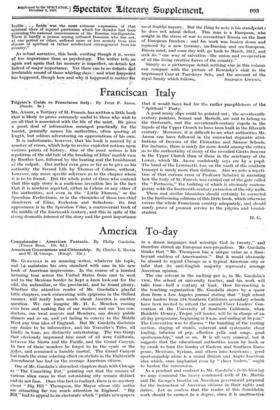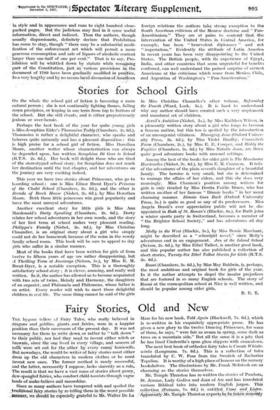America To-day
Mu. GUEDALLA is an amusing writer, whatever his topic, and Le maintains his own standard with ease in his new book of American impressions. In the course of a hurried lecturing tour across the United States from east to west and to the Mexican border he kept a keen look-out for the ' odd, the unfamiliar, or the provincial, and he found plenty. Whether the attentive reader of Mr. Guedalla's playful little chapters, each coruscating with epigrams in the Oxford manner, will really learn much about America is another ; question. We can imagine Mr. H. L. Mencken coming over here and making fun of our waiters and our 'bus con- ductors, our local mayors and Members, our dreary public dinners and so on, and yet failing to convey to the Middle West any true idea of England. But Mr. Guedalla disclaims any desire to be informative, and his Traveller's Tales, all kindly in tone, are distinctly entertaining. The two things that obviously impressed him mot of all were California, between the Sierra and the Pacific, and the Grand Canyon: In face of thelie wonders he forgot to be the cynic or the jester, and remained a humble mortal. The Grand Canyon has much the same sobering effect on stylists as the Eighteenth Amendment has had on the average American citizen.
One of Mr. Guedalla's shrewdest chapters deals with Chicago as " The Unmelting Pot," pointing out that the masses of various alien races in that astonishing city remain distinct and do not fuse. Once this fact is realized, there is no mystery about " Big Bill " Thompson, the Mayor whose silly antics are attcacting far .too muchattention in England. " Big. Bill "had to aPpeal JO elettOrate which'` jarilitSneWspaperS
in a dozen languages and worships God in twenty," 'and therefore stirred up European race-prejudices. Mr. Guedalla thinks that " Mr. Thompson has a unique value as a flani- boyant emblem of Americanism." But it would obviously be absurd to regard Chicago as a typical American city or infer that its anti-English majority represents average American opinion. _ The one solvent in the melting pot is, in Mr. Guedalla's view, the school or university teacher, and his work will take time—half a century at least. How far-reaching is the teaching organization Mr. Guedalla shows by a queer _item from a Los Angeles journal stating that " high school cheer leaders from 114 Southern California secondary schools have been invited to attend the annual Cheer Leaders' Con- vention at the University of Southern California, when Burdette Henney, Trojan yell leader, will be in charge of an all day programme, beginning at 9 a.m. and ending at 10 p.m." The Convention was to discuss " the handling of the rooting section, staging of stunts, coherent and systematic cheer leading, infusion of pep, effective yells and songs, good sportsmanship," and so on. It is all very comical, but it suggests that the educational authorities mean by hook or by crook to turn the hordes of Eastern and Southern Euro- peans, Mexicans, Syrians, and others into Americans ; good sportsmanship alone is a sound British and Anglo-American idea which, once implanted even by " cheer leaders," ought to hasten the conversion.
As a pendant and contrast to Mr. Guedalla's froth-blowing we may commend the heavy condensed milk of Dr. Martin and Dr. George's treatise on American government prepared for the instruction of American citizens in their rights and duties. Let us confess that the reader of this formidable work 'should-be earnest to a degree, since it Is unattractive In style and in appearance and runs to eight hundred close- packed pages. But the judicious may find in it some useful information, direct and indirect. Thus the authors, though usually dispassionate, definitely declare that Prohibition has come to stay, though " there may be a substantial- modi- fication of the enforcement act which will permit a more generous consumption and sale of liquors of alcoholic content larger than one-half of one per cent." That is to say, Pro- ...hibition will be -whittled down by statute while rem*ing part of the Constitution, just as various provisions in the ' document of 1789 have been gradually modified in twaiitice. In a very lengthy and by no means.lucid discussion of Ameatican foreign relations the . authors take. strong exception to the South American criticism of the Monroe doctrine and " Pan- Ameridanisni." They are at pains to contend_- that 4he intervention of the United States in Central America, for example, has been " benevolent diplomacy " and not " imperialism." Evidently the attitude of Latin America in recent years has been very disappointing to the United States. The British people, with its experience of Egypt, India, and other countries that seem ungrateful for benefits conferred, can well understand the pained surprise of earnest Americans at the criticisms which come from Mexico, Chile, and Argentina of Washington's " Pan Americanism."











































































 Previous page
Previous page